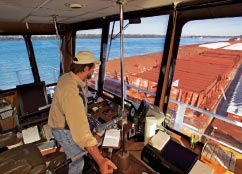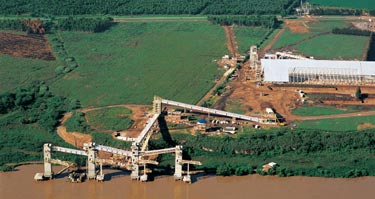Bunge designed its integrated operations to create natural efficiencies. Fertilizer and agribusiness share a focus on the farmer; agribusiness supplies low-cost inputs for food products; and global logistics and risk management overlay
our entire business.
We realize, however, that we can do more. As a result,
we are committed to continuously improving efficiency by strengthening our processes, teamwork and assets.
global initiatives
Bunge's five global initiatives—Productivity, Quality, Safety
and Environment (PQSE); Logistics; Information Technology (IT); People Development; and Innovation—provide a framework for increasing efficiency. The initiatives improve core processes by identifying best practices from within the company and around the world, and promoting them throughout Bunge. True to our decentralized structure, employees drive the initiatives at the local level, where market visibility and agility are greatest and savings most achievable.
 In 2004, the PQSE working groups–procurement, grain handling, oilseed crushing, refining, safety and health, food and feed safety, environment, and sustainable development–identified new approaches in their areas and began the rollout of pilot projects throughout the company. The Logistics initiative ran successful, and profitable, field trials of enhanced loading techniques at ports. The IT initiative enhanced our global online logistics and freight management system. In 2004, the PQSE working groups–procurement, grain handling, oilseed crushing, refining, safety and health, food and feed safety, environment, and sustainable development–identified new approaches in their areas and began the rollout of pilot projects throughout the company. The Logistics initiative ran successful, and profitable, field trials of enhanced loading techniques at ports. The IT initiative enhanced our global online logistics and freight management system.
spotlight on south america
Developing efficient logistics is critical in South America.
In the next five years, the USDA predicts that South American
agricultural exports will increase by more than 30 million tons. With this growth comes a challenge: how to ensure that
transport systems, already strained in some areas, keep
pace with increasing production.
As the largest agricultural exporter in South America, Bunge must meet this challenge. We are investing to do so. Inland transport is an important part of the equation. On average, crops travel more than 1,000 km from farm to export terminal in Brazil. Today, more than 65 percent of the country's agricultural products are carried by truck. Truck freight is less reliable, harder on the environment and about 15 percent more expensive than rail.
To help develop future rail capacity, Bunge entered into a long-term relationship with América Latina Logística (ALL) in 2004. ALL owns and operates railway networks in the southern Brazilian states of Paraná, Santa Catarina and Rio Grande do Sul. Through the partnership, ALL guarantees Bunge significant future capacity, at competitive rates, on vital rail lines that carry crops from inland growing areas in the south, and from Mato Grosso and Goías, to ports on the coast. In return, Bunge commits to ship increasing volumes of fertilizer and agricultural products on ALL trains for the next two decades. ALL will leverage these volume commitments to acquire new rolling stock. By 2010, ALL trains will carry more than 13 million tons of Bunge products, up from around five million in 2004.
 |
| RAMALLO, BUENOS AIRES, ARGENTINA |
 |
 |
|
The results are lower costs and improved reliability for Bunge,
farmers and customers, as well as a better rail network for southern Brazil.
Ports are also key. This is especially true in Argentina, which exports more than 90 percent of its soy products. Because its
agricultural production areas are close to major waterways,
the country is a natural exporter. The addition of large, efficient port terminals accentuates this advantage.
In 2004, Bunge began construction on a high-volume export terminal and storage facility in the town of Ramallo. The facility will handle grains, soybean meal and soybean oil from the underserved Buenos Aires province. Although Buenos Aires produces 35 percent of Argentina's agricultural output, only five percent is loaded there. The addition of Bunge's Ramallo facility will improve the efficiency of our agribusiness operations, boost the province's export capabilities and provide economic benefits to Ramallo itself, a town of only 10,000 residents.
|

